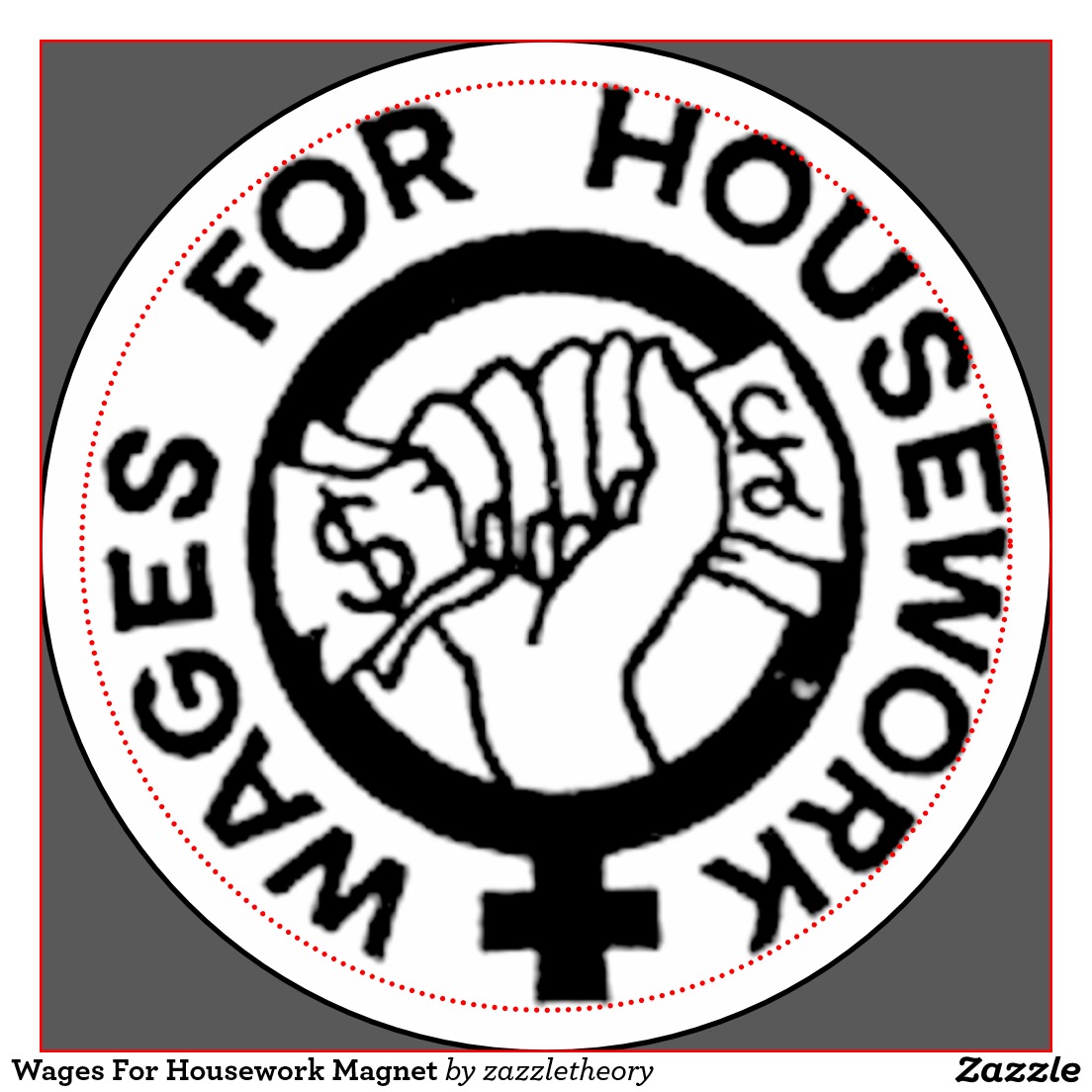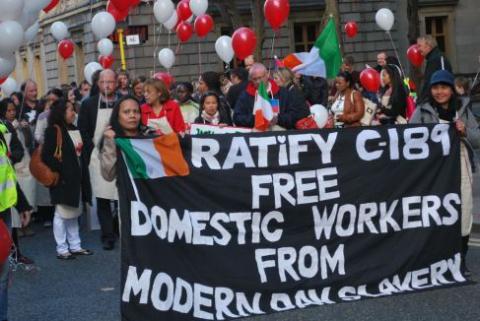
Amelia Clausen
Under the capitalist system, women’s labor is systematically undervalued or dismissed as unproductive. This has been true for all feminized labor, and especially true when it comes to domestic labor. In this study I address the importance of women’s economic contribution in the form of both paid and unpaid domestic labor, and also in the form of emotional labor which is socially expected of women everywhere.
Unpaid Domestic Labor
One form of labor that has been systemically undervalued is unpaid domestic labor, which is effectively an invisible economic activity. If someone works for pay outside the home and spends money on childcare, the labor involved in caring for their child is recognized because money was earned and spent. But if someone stays home and performs childcare themselves, there is no recognition for this work. With no money earned or spent, the activity is not seen as productive and is therefore not recognized as true labor worthy of a wage.

The consequences of this economic invisibility are profound. Unlike the low-wage worker, “housewives” get no credit for their contribution to the household economy and are not protected against future disability or unemployment through Social Security.
Women’s Day Off, Iceland 1975
On October 24, 1975, a general strike occurred in Iceland, where 90% of women took the day off to show the economic significance of their labor. Known as the Women’s Day Off in Iceland, women refused to perform childcare or household duties, and if they worked, they refused to work. CEOs and managers had to take on secretarial duties, schools were shut down due to lack of teachers and flights were cancelled due to lack of flight attendants. Children had to be watched by their fathers (at their places of employment), sausages sold out due to the need to feed the children, and to this day the event is referred to by Icelandic men as “The Long Friday” (BBC).

This is one example of women rising up against unfair treatment within the workforce, and also draws parallels with the Womxn’s March in the U.S. that happened on January 21, 2017.
The year after the Women’s Day Off, parliament passed a law guaranteeing equal pay for women, and five years later Icelanders elected their first women president. Many observers assert that Iceland has the highest gender equality in the world, but of course this just a mainstream idea of what gender equality looks like.
Mainstream feminism encourages women to “break the glass ceiling” rather than to accept the role of subjugation. The term “glass ceiling” refers to the unofficially acknowledged barrier that many face in job advancement due to gender and race inequalities. To many western feminists, the worst thing you could possibly be is a “housewife.” But ascendency of women into the workplace has not translated into liberation for the many women who haven’t “joined the ranks,” nor has it meant that women in higher-paying jobs are not also limited by the role that capitalism has made for them.
The International Wages For Housework Campaign, 1972
The International Wages For Housework Campaign, founded in 1972, brought to light the importance of unpaid women’s labor by demanding that this labor be compensated through direct wages, calling for these wages be paid through the defunding of the military-industrial complex. Wages For Housework was started by the International Feminist Collective in Italy, and was founded by Selma James, Brigitte Galtier, Mariarosa Dalla Costa, and Silvia Federici.

In making the case that women’s contribution is the basic ingredient of all industry and profit, Wages For Housework established that “… our entitlement to benefits, higher wages, social services, child care, grants, unpolluted land, information, technology… … are not charities but wages we are owed” (Freedom Archives).
Many feminists see the demand for wages as a “surrender” because of the fear that if women enter into capitalist relations in ways they have not historically done, they risk the chance of exploitation due to being tied to a wage. But to assume this is to also assume that women haven’t already been exploited for their labor. To see it as a surrender is also to deny the power behind a demand for wages.
In her book Revolution at Point Zero, Silvia Federici wrote about the Wages for Housework movement in the 1970s, claiming that “It is not for us to put limits on our power… It is only for us to organize a struggle to get what we want, for us all, on our terms. Our aim is to be priceless, to price ourselves out of the market, for housework and factory work and office work to become ‘uneconomical’” (Federici, 25).
Emotional Labor
Societal attitudes toward women and housework are so pervasive in our society that they have extended into the waged workplace as women are often expected to perform the “housework” in non-domestic environments. Activities such as making coffee, taking notes, planning events, and tidying up are often expected of women within waged work spaces. Women are also expected to perform the emotional labor of catering to the needs and desires of the people they work with. Silvia Federici spoke to this in her essay Wages Against Housework, saying “…our minds, our bodies and emotions have all been distorted for a specific function… and then have been thrown back at us as a model to which we should all conform if we want to be accepted as women in this society” (Federici, 19).

The role of caregiver that is expected of women was directly challenged by the #GiveYourMoneyToWomen campaign started in mid 2015 by domestic violence educator and prison abolitionist Lauren Chief Elk, analyst and dominatrix Bardot Smith, and private consultant and dominatrix Yeoshin Lourdes. The hashtag started as a way to bring attention to the emotional, physical, and sexual labor that women are expected to perform and to demand that this labor be recognized and compensated.
Their mission statement states that #GiveYourMoneyToWomen “… is a global movement. We are unifying women to a cause that slices to the heart of women’s issues: access to capital and resources. This is a global movement to be compensated for our years and lifetimes of unpaid emotional, physical, sexual, and intellectual labor. You treat us like resources and then get mad when we realize how to turn that back on you. Monetizing the male gaze.”

While women of color generally embraced #GiveYourMoneyToWomen, most of the critiques around the hashtag were from white women, many of whom claimed it gave feminism a “bad name.” When asked about this racial divide in an interview with Vice magazine, Chief Elk said, “… historically speaking, white women are also the beneficiaries of a lot of women of color’s work, and also accrue lots of capital which white men in this country have” (Schaffer).
Katy Horwood made her opinion clear when she wrote in a Huffington Post article, “You want money? Cut out the bitching and moaning and go the f**k out and earn it. Men don’t owe you anything and believe me, the last way you’re going to get it is demanding it from strangers on Twitter…” (Horwood).
Horwood actively denied the value of emotional labor, undermined the power of the hashtag, and discounted the inherently revolutionary act of demanding a wage. According to others like her, affirmation, guidance, pacifying, and moral support have no monetary value. The point she missed is that the revolution does not simply depend on winning a wage. It’s the act of demanding a wage which is revolutionary because it undermines the roles that we are assigned within the capitalist division of labor.

Some feminists, while acknowledging the value of emotional labor, claim that demanding wages for this labor is counterintuitive or even actively anti-feminist. Elissa Strauss expressed her discomfort with the hashtag when she wrote in a Slate article, “Emotional expectations of women are real. And yet something in me recoils when we talk about kindness and love in market terms. I’m just not comfortable with the idea of thinking about affection… as something that belongs on a spreadsheet. The idea that we would get compensation… for it is even worse. It feels more like a surrender than a triumph and turns the act of loving into a zero-sum game…” (Strauss).
To demand a wage for the emotional labor which is expected of us, and to deny access to that labor, is to resist against a patriarchal capitalist system which has always been dependent on the the unpaid labor of women and people color.
Paid domestic labor
Having said all of this, it’s still true that wages don’t necessarily equate liberation. This can be seen in the treatment of domestic workers, who are often considered not “full-fledged” employees (as the Supreme Court suggested in this document). Domestic workers are also often excluded from many labor protections (Cornell University).
Domestic labor in the U.S. carries the legacy of devaluation of women’s work within the household, as well as the legacy of slavery with its divisions of labor along lines of both race and gender. Domestic workers play a critical role in the U.S. and world economy, yet their contributions and experiences are largely invisible from the capitalist viewpoint. The fact remains, however, that without domestic labor all other labor would not be possible within a capitalist society. Domestic labor is what allows others to engage in other more “productive” activities without the burden of having to care for an elderly or sick family member.
A report published by the National Domestic Workers Alliance in 2012 gathered information from over 2,000 nannies, caregivers, and house cleaners from 71 countries, all working in the U.S.. The report found that less than 2 percent of domestic workers receive retirement or pension benefits from their primary employer, less than 9 percent work for employers who pay into Social Security, 65 percent do not have health insurance, and only 4 percent receive employer-provided insurance (Domesticworkers.org). The report also found that 23 percent of domestic workers are paid under the state minimum wage, and 48 percent of workers are paid an hourly wage in their primary job that is below the level needed to adequately support a family.
Due to the nature of domestic labor, the vast majority of worker mistreatment goes unseen inside the home. Unprotected by contracts and laws available to other workers, domestic laborers often live under the fear of employer retaliation. Interviews with domestic workers revealed that they often endure verbal, psychological, and physical abuse on the job. Workers who encounter these problems seldom come forward for fear of losing their jobs.

Several organizations have worked to bring labor protections to domestic workers, including the National Domestic Workers Alliance (NDWA). NDWA was founded in 2007 and it works to raise awareness and recognition for domestic workers. In addition to conducting and publishing the 2012 report on domestic workers (the first-ever large-scale report on domestic workers in the U.S.), the NDWA has also worked put in place the Domestic Workers Bill of Rights (DWBR), which has been signed in Illinois, Connecticut, Oregon, Massachusetts, California, Hawaii, and New York. The DWBR is different in every state that it’s enacted, but it consistently addresses the inequalities that have arisen because of the exclusion of domestic workers within labor protections.
The California Domestic Workers Bill of Rights was passed in 2014, and granted the right to overtime pay for domestic workers who care for children, the elderly, and/or people with disabilities.

The International Domestic Workers Network was launched at the International Labor Organization in Geneva in 2009. The main objective of IDWN was to mobilize domestic workers’ organizations and their allies worldwide to win an International Labour Organisation (ILO) Convention to protect rights of domestic workers, and in June 2011, the ILO Convention C189 Decent Work for Domestic Workers was ratified.
The main rights given to domestic workers through this Convention include guaranteed rest hours, entitlement to minimum wage, and the right to choose where they live and where to spend their leave. This was a historic achievement not only for domestic workers, but for the entire labor movement.
While there have been improvements on the conditions of domestic laborers, there are still injustices that will need to be addressed if domestic laborers are to be totally liberated. The fact also remains that unpaid labor by women and people of color are still the backbone of capitalist society, and until capitalism can be dismantled, exploitation will persist.
Sources
Domestic Workers Bill Of Rights. (2011, June 21. Fact Sheet: Analysis of Domestic Workers Bill of Rights (AB 889).
Federici, S. (2012). Revolution At Point Zero. Oakland, CA: PM Press
Horwood, Katy. (2016, June 5). #GiveYourMoneyToWomen – Giving Feminism a Bad Name. Huffington Post.
Human Rights Watch. (2013, October 27). Claiming Rights: Domestic Workers’ Movements and Global Advances for Labor Reform.
International Domestic Workers Federation. (2017, January 09). About Us.
International Wages For Housework Campaign. Mission Statement.
Schaeffer, Jennifer. (2015, August 1). We Spoke to Lauren Chief Elk, the Woman Behind #GiveYourMoneytoWomen, About the Power of Cold Hard Cash. Vice.
Strauss, Elissa. (2015, December 17). The Year We Wondered if Emotional Labor Should Come With a Price. Slate.
Zats, N. (2014, September 9). Wages for Housework/Taking Unpaid Housework for Granted is Wrong. New York Times.